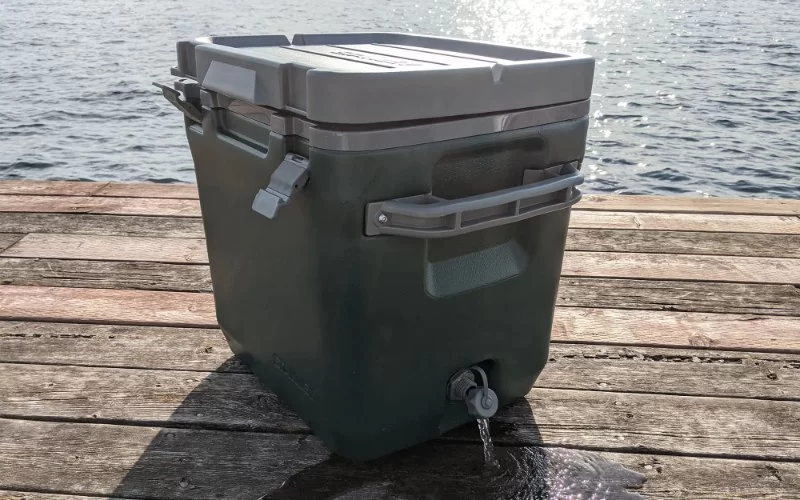Discover the various types of camping coolers with drain plugs, how they function, and which models are best for outdoor adventures. Expert advice and real-user insights included.

- why-drain-plugs-matter-in-camping-coolers
- hard-sided-coolers-are-classics-for-a-reason
- soft-coolers-with-drainage-features
- high-performance-rotomolded-coolers
- wheeled-coolers-ease-of-transport
- real-camper-experiences-choosing-the-right-one
- tips-on-cleaning-and-maintaining-your-camping-cooler
1. Why Drain Plugs Matter in Camping Coolers
1.1 Keeping Things Dry and Cold
Drain plugs aren't just a luxury—they’re essential for anyone serious about keeping their cooler’s contents dry and cold. Melted ice can quickly turn a crisp salad into a soggy mess, and no one wants their burger buns floating in slush. With a simple twist, drain plugs allow you to release excess water without lifting the entire cooler.
1.2 Extended Cooling Efficiency
Removing melted ice can actually extend cooling performance. When water fills up your cooler, it accelerates heat transfer. Draining that water maintains better insulation and preserves ice longer, especially in high-heat outdoor conditions.
2. Hard-Sided Coolers Are Classics for a Reason
2.1 Durable and Reliable
Hard-sided camping coolers with drain plugs are among the most popular choices for weekend campers and serious overlanders alike. Brands like Coleman, Igloo, and YETI have mastered this segment, offering rugged designs that can withstand extreme temperatures, bear attacks (literally, in some national parks), and clumsy campers.
2.2 Case Story: Colorado Campground
In a family camping trip near Pike National Forest, one camper reported his 65-quart hard cooler with a rear drain plug kept drinks ice-cold for four days—even after several kids opened it hourly. The drain plug made it effortless to refresh the ice each morning without tipping over a heavy, wet container.
3. Soft Coolers with Drainage Features
3.1 Lightweight and Convenient
Soft coolers are ideal for short trips, beach days, or kayaking adventures. While not all soft-sided models include drain plugs, some premium designs do offer miniature drains or leak-resistant zippers that serve a similar function.
3.2 When to Choose a Soft Cooler
If you prioritize portability and minimal bulk, a soft cooler with a drain valve can be a game changer. Some users at Pine Cliff Resort noted how compact drainable soft coolers kept snacks and drinks chilled for river float trips—light to carry, easy to clean, and perfect for a day out.
4. High-Performance Rotomolded Coolers
4.1 Built for the Serious Outdoors
Rotomolded coolers are known for their extreme insulation and are a top choice for long camping trips, fishing expeditions, or tailgating. These coolers usually come with heavy-duty drain plugs that can handle volume and last for years without cracking or leaking.
4.2 Feature Highlight
Most rotomolded coolers also include gasketed lids, tie-down slots, and dual drain plugs (one on each side) for quick emptying. That kind of convenience is often underrated until you're trying to drain 100 quarts of icy water in a remote campsite.
5. Wheeled Coolers: Ease of Transport
5.1 Great for Large Campsites or Festivals
Wheeled coolers with drain plugs offer the perfect balance between mobility and utility. They’re ideal for events like music festivals or group campouts where walking distances with gear is inevitable. Popular brands like Coleman Xtreme and Pelican offer high-capacity versions with oversized wheels and reliable drainage systems.
5.2 Example Use
At a summer cookout hosted at Pine Cliff Resort, guests praised their wheeled cooler that not only held 60+ cans but drained quickly using a screw-in plug. No tipping, no spills—just grab, roll, and go.
6. Real Camper Experiences Choosing the Right One
6.1 Prioritizing Ice Retention vs. Portability
One seasoned camper explained how his hard cooler with a drain plug was essential for multi-day forest camping trips, while his partner preferred the soft cooler for its light weight during hiking trails. They used both together—one for base camp, one for day trips. Smart planning makes the difference.
6.2 Lessons from the Field
Drain plugs become non-negotiable when you’re camping in hot climates. One story shared by a Florida camper detailed how forgetting to open the plug on day three resulted in soggy food and a bad smell that haunted the rest of the trip.
7. Tips on Cleaning and Maintaining Your Camping Cooler
7.1 Clean After Every Trip
Even if you don’t see dirt, always clean your cooler with mild detergent and water after use. Mold loves wet environments. Don’t forget to open and drain the plug fully—many coolers now offer removable drain caps for easier cleaning access.
7.2 Lubricate the Plug Thread
Occasionally apply food-safe silicone lubricant to the plug’s threads to keep it from sticking or cracking. That small step can extend the life of your cooler by years.
7.3 Store Dry and Open
Never store your cooler sealed. Keep it slightly open in a cool, dry place to prevent mold buildup and ensure your drain plug doesn't seal shut from residue.
Still unsure which camping cooler with drain plug is right for you? Explore top-rated models and expert picks on Pine Cliff Resort—we help you make your outdoor adventures cooler and more comfortable.
Deer Camp
Montana 59932, USA
Visit Location PageTimberline Glamping at Amicalola Falls
418 Amicalola Falls State Park Rd, Dawsonville, GA 30534, USA
Visit Location Page